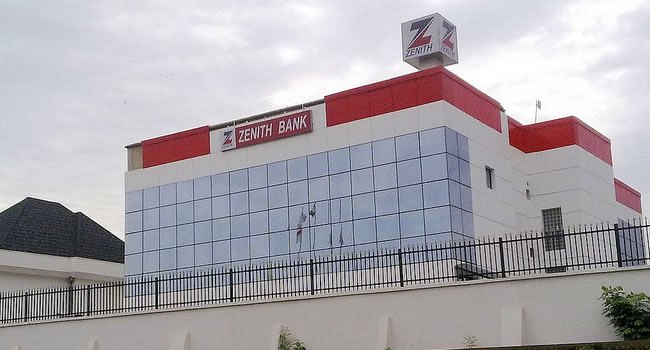Business
Zenith Bank Sustains Growth Trajectory With Double-Digit Growth In Gross Earnings In H1 2022

In a clear demonstration of its industry leadership and consistency in providing superior financial returns, Zenith Bank Plc has announced its audited results for the half-year ended 30 June 2022, recording an astounding double-digit growth of 17% in gross earnings from N346 billion reported in H1 2021 to N405 billion in H1 2022. This is in spite of a very challenging macroeconomic environment.
According to the bank’s audited half-year financial results presented to the Nigerian Exchange (NGX) on Tuesday, 23rd August 2022, this growth was underpinned by a 19% YoY growth in interest income from NGN204 billion to NGN242 billion and an 18% YoY growth in non-interest income from NGN127 billion to NGN149 billion. The growth in interest income was driven by the modest increase in the loan book and improved interest margins. The increase in non-interest income attests to the Group’s success in its income diversification strategy.
Profit before tax (PBT) grew 11% year-on-year (YoY) from NGN117 billion to NGN130 billion. Earnings per share (EPS) also grew from NGN3.38 to NGN3.55 over the same 6-month period.
The Group also recorded an 11% year-to-date (YtD) increase in total customer deposits to close the period at NGN7.15 trillion. The retail strategy of the Group continues to deliver outstanding results as retail deposits grew by 17% YtD from NGN1.82 trillion to NGN2.13 trillion. Retail activities also supported the growth recorded in fees on electronic products which grew by 45% YoY from NGN17 billion to NGN25 billion.
Despite the elevated yield environment, the cost of funds increased only marginally from 1.3% in June 2021 to 1.4% in June 2022. The increase in the cost of funds was lower than the increase in yields on interest-generating assets, giving rise to an improved Net Interest Margin (NIM) of 7.1% from 6.4% in June 2021.
Total assets rose to NGN10.12 trillion at the end of June 2022 from NGN9.45 trillion at the end of December 2021. Despite the headwinds imposed by the operating environment, the Group grew its risk assets as gross loans grew by 5% YtD, from NGN3.5 trillion to NGN3.7 trillion. This was achieved at a moderate NPL ratio of 4.4% (FYE 2021: 4.2%) and cost of risk of 1.4% (June 2021: 1.3%). Prudential ratios such as liquidity and capital adequacy also remained stable and well-above regulatory thresholds at 60.5% and 21.0% respectively.
The Group is focused on advancing its digital banking strategy anchored on a strong technology base, and intends to consolidate on the gains achieved in prior years across all business segments. Combined with the Group’s industry leadership, we expect this to drive improved performance and deliver enhanced returns to stakeholders.
Zenith Bank’s track record of excellent performance has continued to earn the brand numerous awards, including being recognised as Number One Bank in Nigeria by Tier-1 Capital, for the 13th consecutive year, in the 2022 Top 1000 World Banks Ranking published by The Banker Magazine; Best Bank in Nigeria, for three consecutive years from 2020 to 2022, in the Global Finance World’s Best Banks Awards; Best Commercial Bank, Nigeria 2021 and 2022 in the World Finance Banking Awards; Best Corporate Governance Bank, Nigeria in the World Finance Corporate Governance Awards 2022; Best in Corporate Governance ‘Financial Services’ Africa, for three consecutive years from 2020 to 2022, by the Ethical Boardroom; Best Commercial Bank, Nigeria and Best Innovation In Retail Banking, Nigeria in the International Banker 2022 Banking Awards. Also, the Bank emerged as the Most Valuable Banking Brand in Nigeria in the Banker Magazine Top 500 Banking Brands 2020 and 2021, Bank of the Year (Nigeria) in The Banker’s Bank of the Year Awards 2020 and Retail Bank of the year at the BusinessDay Banks and Other Financial Institutions (BOFI) Awards 2020 and 2021.
Similarly, Zenith Bank was honoured as Bank of the Decade (People’s Choice) at the ThisDay Awards 2020 and emerged winner in four categories at the Sustainability, Enterprise, and Responsibility (SERAS) Awards 2021, carting home the awards for “Best Company in Reporting and Transparency”, “Best Company in Infrastructure Development”, “Best Company in Gender Equality and Women Empowerment”, and the coveted “Most Responsible Organisation in Africa.
Business
Ghana’s inflation rises to 23.8% — highest in eight months

Ghana’s consumer inflation rate rose for the fourth consecutive month to 23.8 percent in December 2024.
Samuel Kobina Annim, government statistician at the Ghana Statistical Service (GSS), announced the figure to journalists in Accra on Wednesday.
Ghana’s inflation rate started rising in September last year, when it rose to 21.5 percent, then climbed further to 22.1 percent in October and 23 percent in November.
Annim said the inflation rate recorded at the end of last year was the highest in eight months.
“The rate of inflation… is the third highest in the last 13 months and highest in the last eight months,” Annim said.
Also, food inflation saw a significant jump, rising from 25.9 percent in November to 27.8 percent in December.
Annim attributed the increase to the contributions from specific food items, such as yams, showing drastic year-on-year price hikes of 63.3 percent.
He also highlighted the need for a dual approach to tackling inflation, addressing both monetary and real-sector issues.
“We do emphasise that there are two perspectives in addressing inflation. One is the monetary side… and the other is the real side, with what we’ve seen with food inflation, more particularly the food that we consume, that are locally produced,” he added.
Annim urged policymakers to focus on production, value chains, transportation, warehousing, and reducing post-harvest losses to stabilise food prices.
“Policymakers put in diverse interventions, rather than focusing on, let’s say, only exchange rate or focusing on just some selected items that do not cover the variety of food items that influence food prices,” he said.
Business
Governor Sanwo-olu signs N3.366trn 2025 budget

Lagos State Governor, Babajide Sanwo-Olu, on Thursday, signed the 2025 appropriation bill into law.
The Special Adviser on Media and Publicity to the Governor, Gboyega Akosile, made this known in a post on his X handle.
He said the budget size is N3.366 trillion meant for the continuation of the great works of the Sanwo-Olu administration.
Business
Italy extends work visa for skilled workers for 2025

Italy is taking steps to address its significant shortage of skilled workers by keeping its Work Visa for Highly Qualified Workers program open for 2025.
The country, which is known for its rich culture, food, and history, has faced increasing demand in sectors such as IT, healthcare, and green energy.
These industries are crucial to Italy’s economic growth, and the government is working to meet these demands by attracting foreign talent.
Italy is making considerable efforts to improve its labour market by introducing a series of policy changes to simplify the visa application process, DAAD Scholarship reports. The country’s Work Visa program is designed to bridge the gap between the available talent and the growing need for highly skilled workers.
Italy’s work visa aims to address skill shortages
The Work Visa for Highly Qualified Workers aims to address the skill shortages in key sectors, including information and communication technology (ICT), healthcare, and renewable energy. By opening its doors to foreign professionals, Italy hopes to fill critical positions that are difficult to staff with local workers.
This program is expected to boost the economy by bringing in skilled professionals who can contribute to sectors vital to Italy’s long-term economic stability.
The visa allows skilled workers to live and work in Italy while helping the country meet its industrial needs. In 2025, the visa is seen as a way to attract experts from around the world who can fill gaps in sectors where there is a high demand for specialized knowledge and experience.
Key changes to Italy’s work visa policies for 2025
Significant changes have been made to the Italian Work Visa policies to streamline the application process and ensure faster processing times. One of the major updates is the increase in quotas for non-EU workers.
- Last year, the Italian government raised the quota for work permits from 151,000 to 165,000. This adjustment reflects the increasing need for foreign workers across multiple sectors.
- Another notable change is the introduction of digital processes to simplify the visa application. By March 2024, the Italian government implemented digital contracts and the use of certified email (PEC), which have reduced the need for in-person visits to immigration offices.
- In July 2024, Italy also revised its EU Blue Card requirements, lowering the minimum work contract duration from 12 months to six months. Additionally, the salary threshold was adjusted to fall between 1 and 1.6 times the average gross salary in Italy.
The introduction of sector-specific permits for healthcare roles also occurred in October 2024. An additional 10,000 permits were introduced for family and social healthcare assistance positions to meet the growing demand in the healthcare sector.
Streamlined application process for 2025 work visa
The new application process for the Work Visa for Highly Qualified Workers in 2025 is designed to be faster and more accessible. The digital system allows employers to pre-fill applications for their workers, saving time and reducing paperwork.
The application process is simplified, with designated “click days” for submission, including February 5th, 7th, and 12th, 2025, depending on the applicant’s category, reports inform.
Once an application is submitted, both the employer and the applicant will be notified of the decision within a specified timeframe. Digital contracts and integration agreements also reduce the need for physical paperwork, further speeding up the process.
High-demand sectors for Italy’s work visa program
The Italian Work Visa for Highly Qualified Workers targets skilled professionals in several key sectors. These include:
- ICT: Software developers, data analysts, AI specialists, and cybersecurity experts are highly sought after.
- Healthcare: Nurses, physiotherapists, caregivers, and healthcare assistants are in demand.
- Green Energy: Engineers focused on renewable energy are needed to help Italy meet sustainability goals.
- Construction: Skilled laborers, engineers, and project managers are sought to address Italy’s infrastructure needs.
- Hospitality: Chefs, hotel managers, and tourism professionals are needed to support Italy’s vibrant tourism industry.
Where to find jobs with visa sponsorship in Italy
For those looking to apply for the Work Visa for Highly Qualified Workers, several job portals can help candidates find employment in Italy. Some popular websites where job seekers can find roles with visa sponsorship include:
The program offers a valuable opportunity for professionals in high-demand sectors to contribute to Italy’s economy and enjoy living in one of Europe’s most attractive countries.
-

 Business1 week ago
Business1 week agoAir France deboards French national in Abuja airport for unruly behaviour
-

 Entertainment1 week ago
Entertainment1 week agoLala Akindoju loses dad
-

 News1 week ago
News1 week ago‘He’s a dead man walking’ — military threatens to eliminate Bello Turji
-

 News1 week ago
News1 week agoCelebrating Excellence in Nigeria: The Icons of Resilience, Leadership, and Innovation in 2024!
-

 News1 week ago
News1 week agoLagos state government to probe DJ Kulet’s husband over child molestation allegations
-

 Business1 week ago
Business1 week agoX to launch payment system this year
-

 News1 week ago
News1 week agoFire razes police station, three buildings in Lagos
-

 News1 week ago
News1 week agoUNIMEDTH resident doctors in Ondo begin indefinite strike over poor conditions of service


















